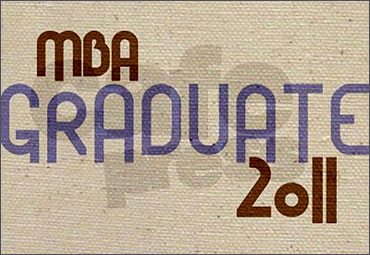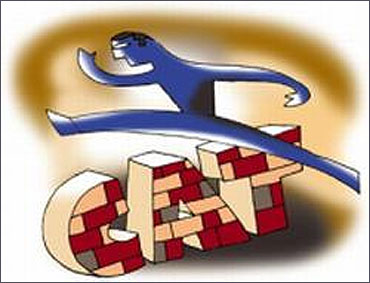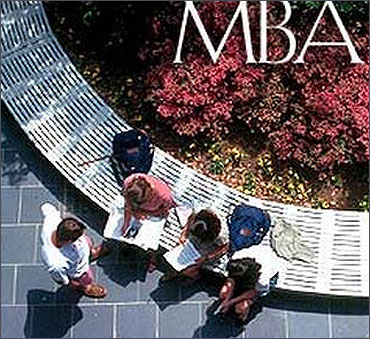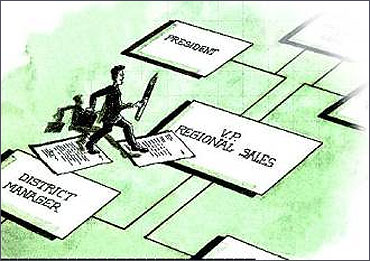K R Senthilvelkumar
The Tata Consultancy Services-Smart Manager Case Contest is the oldest and most prestigious competition of its kind in India.
Apart from a one-year free subscription to The Smart Manager, India's first world-class management magazine, winners from the 'manager' and 'student' categories stand to win cash prises of Rs 25,000 each.
All you have to do is read the case, see the question you have to answer on the last slide, click on The Smart Manager logo below, and post your solutions by August 25, 2011. All the best!
The sound of the tea being poured from the kettle into the empty cups was the only noise that Francis Dennis and Deepak Raman could hear in the otherwise quiet room.
They had walked into the makeshift pantry room adjacent to the conference hall for a breather. Dennis and Raman were representing their respective institutions in a bschool conference that aimed to deliberate on the need to rationalise the public announcement of MBA placement records.
Held at a renowned B-school located near New Delhi, the primary objective of the conference was to evolve a standard reporting procedure for B-school placement records to curb the practice of inflated and false reporting.
The credibility of the Indian B-school education system had gone down in the recent years with controversies plaguing their admission process, curriculum effectiveness and placement announcements.
In a bid to stem this downslide, the idea for standard placement reporting norms was initiated by the country's premier business schools early this year. Soon, most other bschools also warmed up to the idea and joined the bandwagon.
Click on NEXT for more...
Do we really need B-schools? Solve and win Rs 25,000
The two-day conference was attended by about forty such directors from various B-schools across the country including premier schools such as the Bharatiya Schools of Business (BSB).
As the proceedings of the first day came to an end, a few delegates crashed into the pantry for a cup of tea.
Dennis the head of a reputed B-school in Kolkata started talking about his obsession for healthy food and fitness with Raman, the director of a B-school in a small-town in Karnataka. Soon three other delegates who had walked in for tea also joined the conversation.
What started as a casual conversation slowly took a different turn and they started to dwell on a theme of common interest - B-school education.
Dennis took the lead, "At times I wonder whether we are doing justice to management education. With students who are clearly not the best in the country, we strive to become a BSB in our own might. Our team's spirit is battered year after year, when each new batch fails to own our aspiration and does not raise the bar. Our efforts become futile because at the end of the day an institute is judged by the quality of its output."
Raman gave a sarcastic look and commented, "Despite being in a metropolitan city, if you complain about the
scarcity of input talent, think of our plight. We mostly get students who do not have managerial capabilities.
We have to work hard to equip them with those. So I hope you will sympathize with us."
Click on NEXT for more...
Do we really need B-schools? Solve and win Rs 25,000
"Our case is not different. However we are proud of the fact that all our students get placed ultimately, even during recessionary periods. Is this not proof enough that we are doing justice to MBA education?
Somehow we need to spot sources of motivation, else it is easy to become negative!" pitched in Maheshkumar, director
of a B-school in Chennai.
Acknowledging his remark, Dennis continued, "Of course, our responsibility does not end with producing employable students, it also extends to getting them placed. But my question is, 'is it all for a B-school'?
In fact, do you know what we do? In order to account for the effect of any recession, our team continuously works on predicting the future recruitment prospects. Based on this, we often tweak our curriculum to suit the industry needs in the near future. That is how we ended up creating a lot of industry-verticals-specific courses."
Raman shot back, partly due to the fact that their B-school's track record was not as bright as that of the other two, "But Francis, is this what B-schools are meant for? Are we imparting education or running placement agencies? Our task is to impart quality management education to students.
In our school we always ensure that the best inputs needed for creating good managers are delivered. We don't target any short-term verticals, which may vanish in no time. We train them to become managers in any business firm irrespective of size, industry and geography.
We have a quality faculty team which works tirelessly to teach our students the basics of business management. However, we are not successful in improving the input quality of students."
Click on NEXT for more...
Do we really need B-schools? Solve and win Rs 25,000
At this stage, Sunil Sharma, director of a B-school in Mumbai, who had remained an onlooker thus far put forth his point of view, "Deepak, it is a vicious circle! On one hand you need good students to attract good recruiters, and on the other you need a good placement record in the first place to attract good students.
The input quality is not so bothersome as far as our B-school is concerned. To differentiate from others, we have gone in for a tie-up with a US bschool. It has provided us a platform for student and faculty exchanges. Both of them learn a lot from the US connections. After all, 'MBA' is an American concept!"
Prema Metha director of a newly established 10-year old BSB was the fifth delegate in the room. She said, "Sunil, it surely pays to have collaborative efforts with foreign partners.
We have some too. But my humble opinion is that our students will gain much more by taking up internships and work-assignments in the various states of our own country, which possess several degrees of challenges and market potential than a single foreign destination. In fact, our record says that the US students are keener on being exposed to the diverse Indian scenario than vice versa. Our inherent advantage at BSB "
Before she could complete her thought she was interrupted by Raman, "Prema has a valid point. I feel that we cannot be content by just meeting the industry requirements. We have a social obligation too.
With about 40 per cent of our population below the poverty line we need to sensitise our MBA students towards their social responsibility. Most of our MBA students don't care enough to understand the problems prevalent in our society "
Click on NEXT for more...
Do we really need B-schools? Solve and win Rs 25,000
Photographs: Illustration: Uttam Ghosh/Rediff
Dennis intercepted him to say, "Let us not expect too much from an MBA degree. It is unfair to expect an MBA to substitute a Master of Social Work or so.
Let us not get confused! An MBA will only help a student to master the knowledge and skills required for managing a business entity successfully " at which, Dennis was interrupted by Raman, who shot back, "No, what I meant was that most of the issues that the corporate entities face are caused by their lack of sensitivity to the environment.
The recent debacle of many US firms stands testimony to this. Don't you feel that the overambitious MBAs with less conviction in ethical values cause more harm than good to businesses?
Don't you think that it is time we stressed on business ethics in our curriculum? Our MBAs need to be taught as to how by addressing the social issues companies can build their image as well as ensure new untapped markets for their businesses.
The bottom of the pyramid holds a good potential, after all! We usually pump an overdose of achievement motivation into our MBAs, who finally end up becoming 'Masters of Bad Attitude'.
They enter their corporate careers with overconfidence believing that their street smartness will help them achieve success."
Click on NEXT for more...
Do we really need B-schools? Solve and win Rs 25,000
Having waited so far to continue her earlier argument, Metha jumped at the first small pause, "My argument was hijacked by both of you however you have conveyed exactly my views on the subject. The need of the hour for any business is 'creativity and innovation'.
They need to harvest creative ideas for solving unaddressed problems through innovative products. A good market may lie in any geography, product/service category, consumer segment - it does not matter; an MBA needs to have a bent of mind to evaluate everything using out-of-the-box thinking. That is what we are trying to instill in our students.
But how successful we are in this is questionable! Our key strength is that all our faculty members are doctorates in management. They work on various research areas of their own interest. An MBA student who works with them also learns to analyse anything with a research orientation."
"I humbly beg to differ, Prema. It is debatable; I don't agree with you on the relationship between the Ph.D qualification and effective teaching of management courses. Being a BSB graduate of class 79 myself, I have always found the courses taught by faculty members with rich industry experience more relevant.
The same has also been observed by our current students. A Ph.D is more appropriate for a science or an engineering
program but is not very much of a necessity for a business education!" said Sharma.
Click on NEXT for more...
Do we really need B-schools? Solve and win Rs 25,000
Metha replied, "May be. But we have the right combination of full-time and visiting professors. We meticulously plan the assignment of courses. We ensure that application-oriented elective courses such as sales, advertising etc, are taught by veteran industry people.
But MBAs cannot afford to miss out on the scientific research. Though it is not used so much by business firms in India, as in the western context, students nevertheless need to learn the nuances of scientific research. They can blend it with their intuitive observations and qualitative insights.
So, I cannot fully agree with the view that business education and scientific research do not blend with one other. Our faculty team is one of the best in the country in terms of research publications and my only concern is that those from non-BSBs do not take research writing seriously."
Dennis came back packing a punch, "It is wrong to judge the expertise of faculty members through quantitative research articles. The work should be purposeful. Two of our senior faculty members are on the board of well-reputed companies and their expertise is most sought after. Their contribution is more meaningful than the so-called research articles which none in the industry gets to see."
Sensing that the discussion was veering towards sensitive issues, Sharma put forward some balanced views, "Prema, we heard the same observation from our foreign counterparts. They were curious to know why research publication is not taken so seriously in India.
We have told them that it is not true and there are a lot of peer-reviewed journals available in India, of late, for publication of B-school faculty work. But the only difference between western bschools and ours is in terms of linkage with the industry.
The collaboration is strong in the west. Beyond BSBs there are a very few Chairs sponsored by Indian companies in B-schools, and the firms don't actively seek academia's help in managing their businesses. Similarly, the academia doesn't
really bother to reach the businesses."
Click on NEXT for more...
Do we really need B-schools? Solve and win Rs 25,000
Metha agreed with Sharma, "True, consultancy is indeed not 'on' here. How can a B-school claim to teach business management to students when it is not connected with business in real life? How can B-schools credibly claim that they can produce future business leaders?"
"Our consultancy assignments may be relatively dismal. But that does not mean that we are not connected to business reality. Our consultancy is extended to business firms indirectly through students' projects. We make sure that our faculty-guides spend quality time with their students to help contribute to the respective businesses.
The fact that 10 per cent of our students have pre-placement offers and all our campus recruiters repeatedly visit us is an indication that our connect with the industry is meaningful and mutually rewarding," boasted Maheshkumar, who had kept quiet for so long.
He then added, "Our model may be different from that of the BSBs' but we are as relevant as them in the field of business education."
Raman enthusiastically joined the debate with his views against BSBs, "Prema, be honest and tell us. Will the BSBs still be the same without the entry of the brightest of the aspirants as students? In a way, the recent comment made by one of the central ministers is valid.
You enjoy an edge over others because of the quality of your students. Look at us! Our task in an upcountry B-school is more challenging and meaningful than that of yours. We produce business managers and leaders out of those who primarily are not meant for these roles. Whose contribution is larger?"
Click on NEXT for more...
Do we really need B-schools? Solve and win Rs 25,000
Metha did not want to give up, "Well, let us look at it objectively! How do you define 'bright candidates'? How do you evaluate their suitability for an MBA degree? By their mathematical skills? Command over the English language? Quick-witted nature? Maybe we are all mistaken. These skills do not make them suitable for managerial or leadership roles.
I agree that the present admission system for the BSBs or other bschools tests only this; but it is wrong. It is easy to train average students to become 'bright candidates' through a series of training interventions spanning six months to one year.
This is the transformation all these CAT trainers are aiming at. I am not sure if it really helps the right candidate to gain admission into the BSBs. The open essay section is being introduced to overcome these limitations. Many more such changes in the content of CAT are in the offing.
Deepak, don't be so pessimistic! Who knows you may be getting a better lot of students for your MBA program than BSBs! I am reiterating - the yardstick for a managerial role is not mere confidence or mastery over Mathematics and English.
These are hygiene factors. It is time that we selected students based on traits such as emotional balance, resilience against failures, sensitivity to fellow human beings, sincere commitment, creative thinking and so on because a managerial or leadership position in business firms in the changing scenario calls for all of these."
Click on NEXT for more...
Do we really need B-schools? Solve and win Rs 25,000
The silence in the room seemed to suggest that Metha's argument was convincing and logical. Dennis acknowledged it explicitly, "I agree with you. You have a valid point. Just like this straight-jacket admission test, there is another problem looming over management education that we need to deal with - the B-school rating mania.
India has around 4,000 B-schools with different affiliations ranging from the conventional university-affiliated to the autonomous under university-affiliation to the AICTE approved without university affiliation to the entities without any regulatory strings.
Riding on this wave of growth of B-school education, publications have turned this into a lucrative business through circulation and advertisements. Let it be so but our concern is: are these ratings unbiased?"
Raman intervened, "It is ridiculous. Is it a box-office for music or movies? What is the point in ranking educational institutions? In my opinion, institutions can only be either good or bad; there cannot be any other shades possible in their quality.
It is the American way of looking at things! You know what these rating agencies do? Somehow they reserve the first 10 rankings for the BSBs, PMSI and the like so that the credibility of their work is not doubted. This is a mockery! Most of these surveys are based on the responses given by the institutions themselves; how can they be true?"
Mahesh echoed Raman's opinion when he said, "Each rating gives weightages differently for infrastructure, doctorally qualified faculty, average salary paid by recruiters, programs organised in the institution and so on, and there are a lot of disparities across these ratings, which indicate that they may be biased."
"The term 'rating' itself means that there is an element of subjectivity. We should not take them so seriously.
Click on NEXT for more...
Do we really need B-schools? Solve and win Rs 25,000
"But I think what we can do in this is to propose some uniform standards for ratings, just like what we are trying to achieve in placements. What do you all feel?" asked Sunil Sharma realising that he was opening another Pandora's Box.
Metha without directly answering it said, "Well, we have come full circle. That is a good way of getting back to what we started discussing. We are all back to square one! These standards are going to be based on what we feel a B-school should focus on. What do we think a B-school should primarily aim at?
On the sidelines of the conference that was meant to discuss the public disclosure of placement records, these five heads of various institutions debated on the purpose of bschools' existence again.
Oblivious of the duration of the discussion, this continued for some time, until their attention was diverted to the sound of utensils being placed in the adjacent dining hall. Realising that they had outlived their tea time, they cut short their debate and quickly departed to their respective rooms before returning for dinner.
Your question
You have read the varied observations made by the five B-school heads about issues related to B-school
education and the remedial measures possible. What do you think is the core objective of a B-school?
Click on the logo below to submit your analysis. Or you may want to mail your analysis to casestudy@thesmartmanager.com.
- Your solution and analysis shouldn't exceed 500 words.
- You will be judged on the analysis, clarity of thought, viability, completeness of the solution and language.
- We want plain text: no tables, charts, graphics or any other visuals.
- There is no entry fee for this contest.
- Keep a photo of yourself handy, in case you win.
- For more details, log on to www.thesmartmanager.com or email casestudy@thesmartmanager.com
- Selected to present common managerial dilemmas, the contest case studies are fictitious and have no relevance to any specific company.
-
(Note: Please check your email after registration for your username and password).
All right reserved with The Smart Manager












article